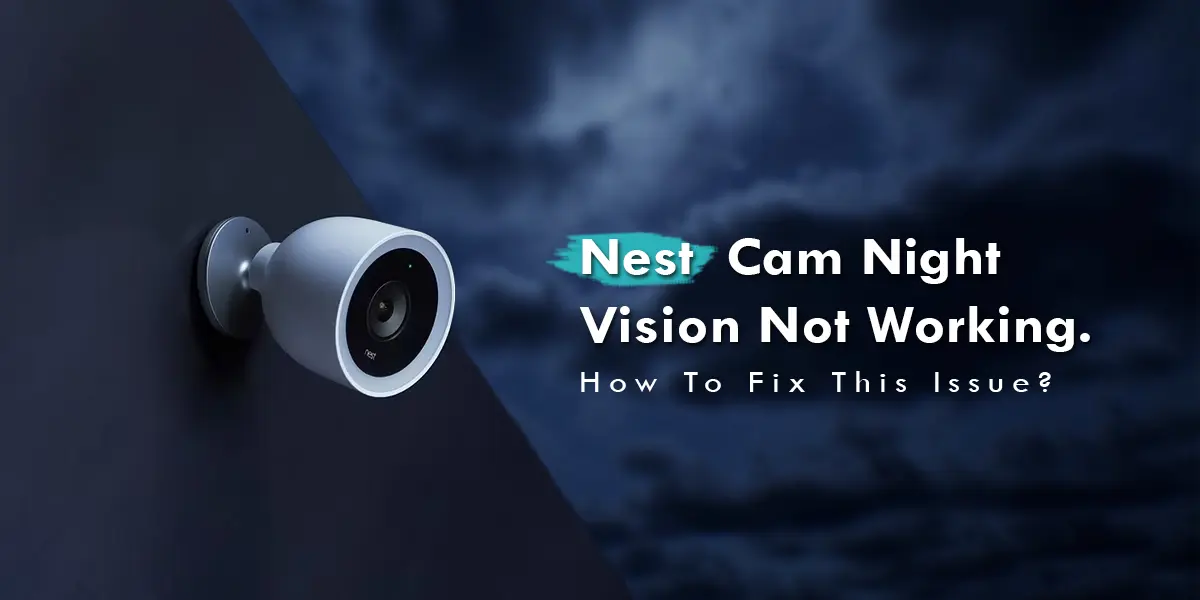
Nest Cam, renowned for its dependability and smart features, provides piece of mind with its surveillance capabilities. However, problems such as night vision not working might be aggravating. Fret not, as this blog post will provide a complete guide to troubleshooting and resolving this issue.
To troubleshoot night vision, first understand how it works. Nest Cam’s night vision uses electromagnetic LEDs to irradiate the part in near to the ground light or dimness. When the ambient light level falls below a specified threshold, these LEDs turn on automatically, allowing the camera to record clear footage even in low light conditions.
Common Night Vision Issues:
Several reasons can contribute to the Nest Cam’s night vision malfunctioning:
- Filthy Lens: A filthy lens can block infrared light, reducing night vision capabilities.
- Firmware Errors: Software faults or obsolete firmware might cause night vision problems.
- Power Issues: An insufficient power source or bad connections can prohibit the IR LEDs from working properly.
- Ecological Features: Life-threatening temperatures and clamminess heights can have an impression on the camera’s performance.
- Physical Damage: Physical damage to the camera or its components might also affect night vision capabilities.
Troubleshooting Steps:
Follow these methods to diagnose and resolve Nest Cam night vision issues:
Clean The Lens: To unsoiled the camera lens, moderately smear it with a lenient, lint-free fabric. Remove any dust, smudges, or anything that may have obstructed the infrared light. Circumvent consuming punitive substances or abrasive items that may harm the lens.
Check Power Supply: Ensure the camera has enough power. Use Nest’s official power adapter and cable, and ensure they are firmly connected.To rule out any power-related difficulties, try inserting the camera into a different power outlet or using a different power adapter.
Restart The Camera: Restarting can help repair software issues. Disconnect the camera from the power source, pause a few moments previously re-joining it. Alternatively, you can restart the camera using the Nest app by going to the camera’s settings and choosing the restart option.
Update Firmware: Ensure your Nest Cam has the most recent firmware version. Unveil the Nest app, steer to the camera settings, and squared for any accessible upgrades. If an update is available, simply follow the directions to install it. Firmware upgrades frequently include bug fixes and enhancements that can address night vision concerns.
Adjust Camera Settings: To adjust camera settings, access the Nest app and review the night vision settings. Make sure night vision is enabled and set to automatic mode, so the camera can switch between day and night vision as needed. You can also change the sensitivity or intensity of the IR LEDs to improve night vision capabilities.
Resetting The Camera: If the previous methods do not address the issue, consider resetting the camera to factory settings. Proceed with caution, as this will delete all custom settings and preferences. To reset the camera, go to the Nest app’s settings, choose the camera, and then select the reset to factory settings option.
Final Thoughts
To repair night vision issues on your Nest Cam, use these troubleshooting steps to restore its functionality. By following the methods provided in this blog, you may pinpoint the source of the problem and execute the necessary fixes. Remember to update and maintain your camera’s firmware on a regular basis to avoid future problems. With these instructions, you may have reliable surveillance and peace of mind knowing that your Nest Cam is working properly, day or night.